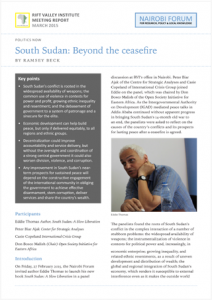On Friday, 27 February 2015, the Nairobi Forum invited author Eddie Thomas to launch his new book South Sudan: A Slow Liberation in a panel discussion at RVI’s office in Nairobi. Peter Biar Ajak of the Centre for Strategic Analyses and Casie Copeland of International Crisis Group joined Eddie on the panel, which was chaired by Don Bosco Malish of the Open Society Initiative for Eastern Africa. As the Intergovernmental Authority on Development (IGAD) mediated peace talks in Addis Ababa continued without apparent progress in bringing South Sudan’s 14-month old war to an end, the panelists were asked to reflect on the causes of the country’s conflicts and its prospects for lasting peace after a ceasefire is agreed.
The panelists found the roots of South Sudan’s conflict in the complex interaction of a number of stubborn problems: the widespread availability of weapons; the instrumentalization of violence in contests for political power and, increasingly, in economic enterprise; growing inequality, and related ethnic resentments, as a result of uneven development and distribution of wealth; the global and regional integration of South Sudan’s economy, which renders it susceptible to external interference even as it makes the outside world reluctant to challenge South Sudan’s leaders; and, most importantly, the debasement of government to a system of patronage and a sinecure for the elite.




